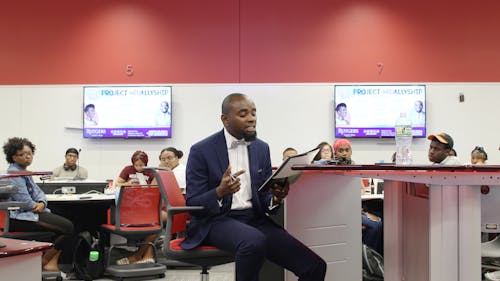Lecture at Rutgers explores America's roots as part of #RUAllyship month

Just a day after Columbus Day, when Americans found themselves embroiled in a debate about which historical figures to memorialize, guest lecturer Dr. Hakim Williams of Gettysburg College spoke to about 40 students, staff and faculty members to share some food for thought about the indigenous suffering upon which American hegemony is built.
On Tuesday evening in the Academic Building on the College Avenue campus, the Rutgers Center for Social Justice Education and LGBT Communities (SJE) invited Williams to present a talk entitled “International Solidarity: A Journey of Self, Nation and Earth.”
“Since the personal and the political often have a sort of dialectical relationship … I will enter this talk there and meander it to my conclusion,” Williams said as he began his presentation.
His speech was a self-proclaimed admixture of autobiography, translational identity formation, immigration, American liberation and internationalism. Williams began with his childhood in Port of Spain, the capital of the Caribbean nation Trinidad and Tobago.
When his mother moved to America to work, Williams became the man of the house at 9 years old, he said. He was tasked with caring for an ailing grandmother and a younger brother.
“‘Out’ became my mantra,” he said. “Out of Laventille, out of poverty, out of Trinidad, out of my very own shy and closeted queer skin.”
Ten years later, he and his brothers would join his mother in Crown Heights, Brooklyn, where Williams attended college and became aware of his “colonial education,” he said.
“Being on this land, now having so much privilege, I have had to understand and interrogate the histories of indigenous folk here and much of their contemporary flight,” Williams said.
According to Williams, decolonization entails a two-part process: unveiling and naming the structured violence behind the logic of coloniality and disconnecting from its repressive epistemologies.
America, he argued, has not yet fully liberated herself.
“Part of America’s liberation involves some intrapsychic work that is far from over,” Williams said. “And trauma, when not possessed or sublimated, lives in and weakens the body, showing its head in strange, unhealthy ways until we confront it.”
He said that the United States is a nation founded on native genocide, slavery and the penetration of and meddling in many territories. He cited police brutality, mass shootings, the fact that the U.S. houses 25 percent of the world’s prisoners despite only comprising 5 percent of the world population and increasing drug addiction and obesity rates.
“This empire is self-cannibalizing because it has not possessed its traumas,” Williams said.
He also expressed concern for the movement toward reinforced borders, stating that nationalism is a threat to the sustainable and just internationalism which he envisions.
“How do we create radical alternatives if we are using the very foundations of slavery, colonialism, imperialism and indentureship?” he asked. He said the audience needs to understand that “their own liberation (is) bounded with that of others.”
Williams appealed to the example of Paul Robeson, one of Rutgers’ most esteemed alumni and the namesake of Rutgers’ African-American cultural center, which is recognized as the first in the nation on a college campus.
Robeson, he said, was not only involved in the civil rights movement but was also a devoted internationalist who spoke out against fascism and imperialism despite being blacklisted in the McCarthy era.
Williams said Robeson acted as an ally not out of guilt, but out of responsibility. He urged students to do the same.
“This kind of allyship in furtherance of solidarity is what we need now,” Williams said.
The event is part of the Center’s Project #RUAllyship, an initiative meant to unite the campus community around areas of social justice, diversity and community building, said Keywuan Caulk, the assistant director of the Center for Social Justice Education and LGBT Communities.
Caulk noted that the topic of international solidarity is particularly relevant because of the University’s global reach and added that many students and staff are connected to places, people and cultures outside of the United States.
“I hope that our community gains a sense of urgency to expand our worldview, engagement and movements to a global perspective,” he said.
The month-long Project #RUAllyship series seeks to coordinate opportunities for students, faculty and administrators to gain a deeper understanding of the experiences of others and to raise awareness of the individual and collective injustices plaguing society, according to the website.
In addition to William’s lecture, this month’s Project #RUAllyship campaign also includes a “Voices of LGBTQ Veteran and Active Service Colloquium,” taking place today from 8:30 a.m. to 3 p.m. in the College Avenue Student Center. There are several more lectures and training events taking place throughout the month to facilitate mutual understanding on campus, including a workshop on how to organize a public policy campaign to effect community change.
“Working from an intersectional and intercultural understanding of oppression, the entire campus community will be challenged (this month) to examine stereotypes and prejudice,” Caulk said.



